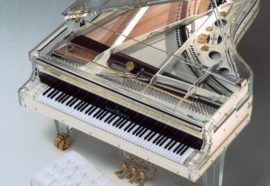In the wake of Hurricane Harvey, several piano owners have to contend with instruments damaged by water in differing extents. A piano suffers water damage if the water level rises beyond the piano case. The piano becomes hard to restore if the strings action and soundboard become water logged which leads to glue failure.
The glue will come apart when the rim and keypad are covered and take in water making it hard to restore these parts. This is because piano strings are tuned at extremely high pressure and tension which is hard to replace when it is lifted.
If the water has not penetrated these parts, for example, the piano was exposed to a few seconds of rain before being moved to safety, it can be restored. The moisture is likely to cause some damage such as:
• The metal parts of the piano will rust. These parts include the strings, tuning pins, action, and the plates that help keep the tension on the strings
• The wooden parts of the piano including the glued joints and the cardboard case expand upon drying and crack
• Felts are swollen by the water. The action felts harden and become unglued after drying while hammer felts lose their elasticity and the ability to give a resonant tone
• Actions centers swell and stick as while key bushings become unglued
• Growth of fungi and mold in hard to reach parts
• The piano finish peels and cracks
• If the case is made of cardboard, like in most modern pianos, it will crumble water damage assessment
Unless you are a qualified piano tuner or technician, do not attempt to open up the piano to do damage assessment. You may cause more damage to the delicate mechanism of the piano. It is advisable to take the piano to an expert who will list down the parts that can be replaced, or say whether the piano is a write-off.
This is also for insurance purposes. If your piano is insured, you could jeopardize your insurance cover by opening it up. Contact the piano expert who can do a comprehensive report.
Growth of mold and bacteria
Mold and bacteria are likely to grow in a piano even after it has dried to some extent as hard to reach parts may not dry up as fast. These two organisms pose health hazards to anyone sitting at the piano. It is important that the piano is fumigated after drying to halt and eliminate growth of these organisms.
If you need any assessment for your flooded piano please do not hesitate to contact me at 832.594.7267. I am here to help!






